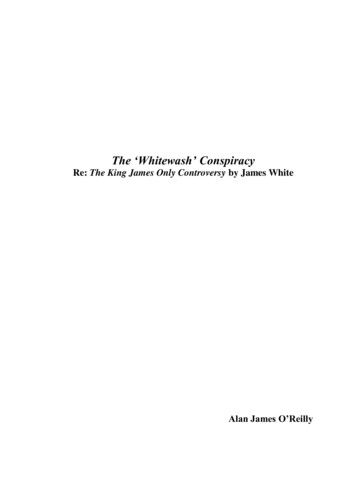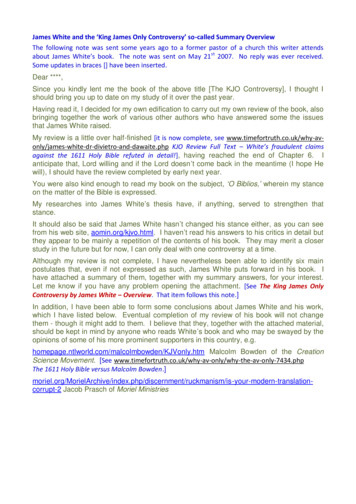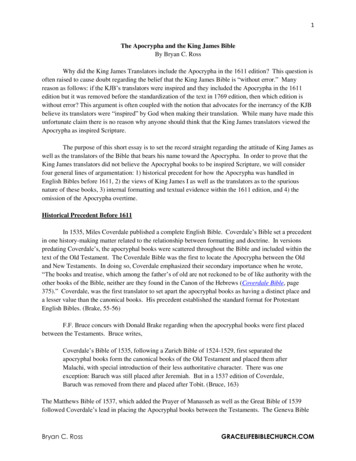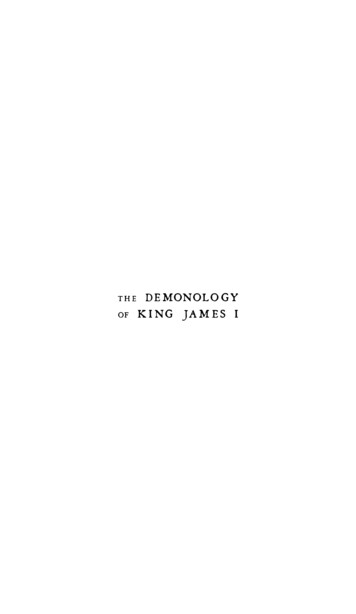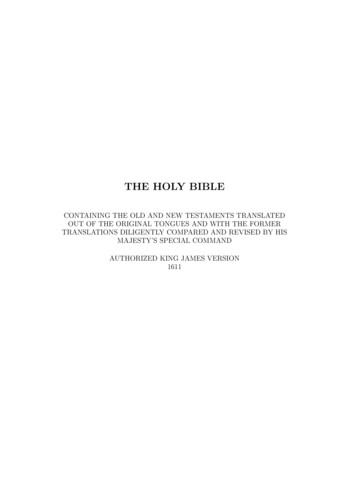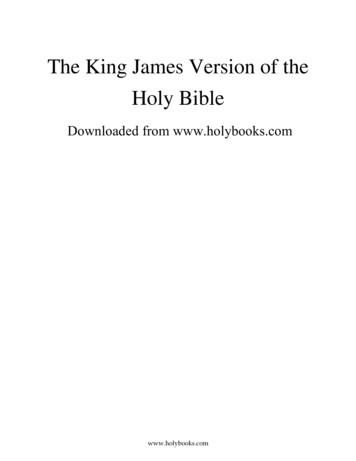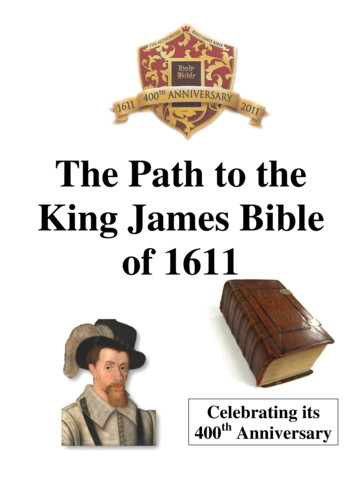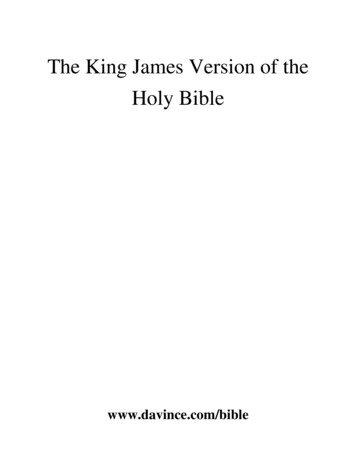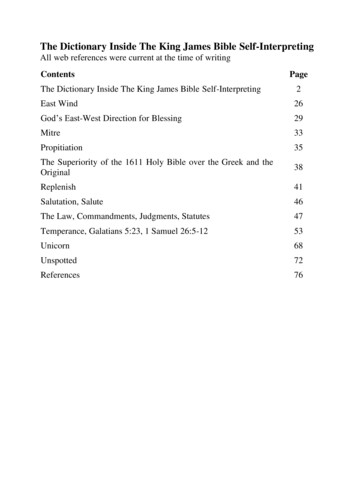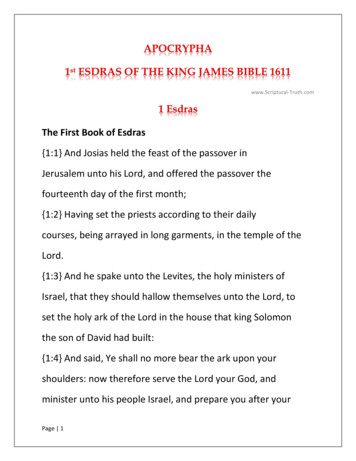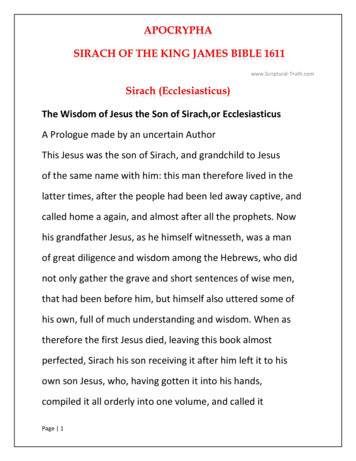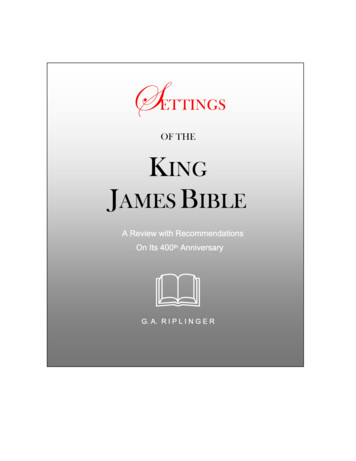
Transcription
fETTINGSOF THEKINGJAMES BIBLEA Review with RecommendationsOn Its 400th AnniversaryG. A. R I P L I N G E R
SETTINGS OF THE KING JAMES BIBLE:A Review with RecommendationsOn Its 400th AnniversaryThere exists on the market today a variety of King James Bibles. Somehave good historic, linguistic, and Biblical support for their orthography.Generally speaking, the British publishers (Cambridge, theTrinitarian Bible Society [TBS]), Oxford, and our American church-based LocalChurch Bible Publishers [LCBP] in Lansing, MI have produced the historicallyfaithful settings. On the other hand, American Publishers, such as Zondervan, Nelson,and the American Bible Society have introduced modernizations and Americanizations ofspelling and have introduced careless and original capitalization in words, such as ‘Spirit’and ‘Lord.’ I will address these problems first and then discuss the wonderful settingsthat Cambridge and the Trinitarian Bible Society provides.The Unacceptable American SpellingReams of paper could be used, documenting variants in printings by Americanprinters. In fact, I have an entire office devoted to this subject alone, with walls of booksand a seeming mile of files. Trying to distil the essence of what I have found duringseveral years of research will be virtually impossible.As Britain colonized much of the English-speaking world, they brought with themtheir British spelling, which now covers the globe. Ethnocentric American publishers areignorant of this and have introduced American spelling into the King James Bible. Oftoday’s over two billion English-speakers, whether as a first or second language, certainlya good percentage are not American and have never seen American spelling. Americanpublishers are also unfamiliar with the fact that some of the words in the KJB havealmost strictly Biblical usage and spelling and therefore cannot be secularized. This canbe verified by examining the Bible’s words in the twenty volume Oxford EnglishDictionary. It demonstrates that numerous Bible words are not, in fact, archaic, butactually are much later in origin and have almost exclusively been used in the Holy Bible.The word ‘holpen’, for example, has had Biblical usage, almost exclusively, and is not anarchaic form of ‘help,’ which is a much older word.The following are samples of secular or American spelling that has beencarelessly introduced by American Publishers, beginning with the American BibleSociety, as early as 1856. Zondervan, publisher of the NIV, as one might expect, isthe worst offender. Nelson, publisher of the NKJV, has editions which change thespelling of many words. They even give a list in the front material of some editions.These new version (NIV, NKJV) publishers have a vested interest in making theKJB appear as unstable as possible, to foment the ‘glories’ of their corrupt newversions. One example will paint a clear picture:2
The following is an explanation of ‘why’ ‘musick’ cannot be spelled ‘music’ in anEnglish (not American) Bible.The English Bible is English. Read that again. It is not American. It is English,that is, from England. You’ve heard of English tea, English furniture, and English ridingsaddles. The Bible was written in England, in English. Noah Webster was adamant aboutAmericanizing this to show America’s independence. His dictionary of 1828 set about todo just that. What he and many fail to realize is that the English have reasons for spellingas they do. Remember, they are the progenitors of English. The Saxons, who adopted theRoman alphabet, used ‘c’ with its hard sound, like that of ‘k’. But after the Normaninvasion and conquest, ‘c’ before ‘e’, ‘i’, and ‘y’ took the sound of ‘s’. It becamenecessary to change this letter in words where it was necessary to retain the ‘k’ soundbefore vowels. This created problems, so our ancestors introduced ‘k’ from the Greek,after ‘c’. In syllables beginning with ‘i’ and ‘e’, ‘k’ is added to ‘c’. We see this in wordssuch as ‘musick’. Early English writers took both letters, the ‘c’ from the Romans, andthe ‘k’ from the Greeks, to solve the problem. Or should we teach sight-reading insteadof phonics? The former has left millions of students unable to read? Generations ago,many learned to read from the King James Bible. It still works.A missionary to Kuwait in the Middle East told me the following story. He taughtat an ‘English’ speaking school, which drew students from every corner of the world,brought there by their parents, who were employed in the oil industry. All of the studentsspelled the word ‘music’ as ‘musick.’ He marked it wrong on all of their papers and wasmet by angry parents from every nationality and continent, European, Asian, African, andetc. He quickly learned that the entire globe, except for America, speaks and spells‘British’ English.Spelling changes normally do not change theology. Remember the word ‘word’ isspelled as ‘woort’ in Dutch and ‘wort’ in German. It has been spelled historically insouthern Europe as palabra, parole, parolle, palavra, palaoulo, parola, and pled. These arenot theological differences. God has not abandoned his word to heresy. But internationalEnglish must be maintained worldwide. It would be similar to the U.S. creating their owntime, longitude, and latitude, instead of following the worldwide Greenwich, Englandtime, longitude and latitude. We think of British English as ‘old fashioned’ but it is in factquite modern in all the other countries of the world. The 1200 page book, In Awe of ThyWord, explains this in complete detail (G.A. Riplinger, In Awe of Thy Word:Understanding the King James Bible, Ararat, VA: A.V. Publications, 2003).The following are just a few examples of one Zondervan Bible and how theychange the spelling of words and show innovation and carelessness in other ways. Afew are differences seen in good Cambridge or even Oxford editions, but most aresimply Americanized or secular spellings, typos, misplaced commas, or innovativeand careless errors. Generally speaking, the left column is Cambridge or Oxford;the right column is Zondervan.3
AbrahamAfter that, the sonsalwayancleAmmielAnd he will cut woodand his sonsAnd if thouand landanswered themany thingAppii forumroundasswageat shbehovedBeth-Jeshimothbewrayethbidebroidedburnt offerings,cast four ter in lawdrink offeringdwelling placeElam andencloseenquireensampleenquiredenquiryEphron dweltevildoersAbraham,after that the sonsalwaysankleAmmiolAnd we will cut woodand his sons,For if thouand the landanswered them,anythingAppiiforumaroundassuageat nt offeringscast forth hter-in-lawdrink offeringsdwellingplaceElam, andincloseinquireexampleinquiredinquiryAnd Ephron dweltevil doers4
eye sightEzion-gaberfartherfather in rst fruitsfirstbegottenfeetfor ever,free willfulnessgarlickGentiles,graffgraffedhand breadthhand weaponhavockHe, thather’sheretickhighwayhim,hinder parthis Spirithoisedholesholpenholy Spirithouse topHowbeithungredI bear you tfruitsfirst begottenfootfor breadthhandweaponhavocHe thathersheretichigh wayhimhinderparthis spirithoistedholdshelpedholy spirithousetopHowbeit,hungeredI bear your Judah5
Judaea,knopland of ringlunatickmaidservantmarishesMicahmixtmortermoth eatenmother in nightno thingNow the queenold time sayingoughtPannagpayedPerizzitesplains of pourtrayedpractisepransingprayethpressfatpriests of the LevitespruninghookspublickJudaeaknobhand of Naomilentilslainlooking ,nothing,Now the queen,old time, sayingaughtpannagpaidPerizzites,plains of ayedpracticeprancingprayedpressvatpriests the Levitespruning hookspublic6
westshewingsithsoderingson in lawsopeSpirit of GodSpirit of the illysupplicationssuretishipsweet smellingsycomoreSyria and CilicaiSyriackthat I purpose,the kingthe LORD: andthe rivertherefore,throughlyto dayto morrowto -in-lawsoapspirit of God (8 times)spirit of the LORD (20 eSyria, and CilicaiSyriacthat I purposethe king,the LORD andthe ertraffic7
travelutterwailingwastwatch towerwell favouredwell pleasingwerewhom he hadwhose soeverwilling heartedwinefatwise l favouredwellpleasing,were,whom ye diahOther non-Cambridge or non-Oxford KJBs may exhibit changes, such as thefollowing: Some change ‘darkness’ to ‘blindness’ in 1 John 2:11. Some change chesnutto chestnut, labour to labor, Saviour to Savior, vapour to vapor, clamour to clamor, colourto color, armour to armor, behaviour to behavior, odour to odor, rigour to rigor, rumour torumor, endeavour to endeavor, neighbour to neighbor, favour to favor, succour to succor,astonied to astonished, Sion to Zion, Stoicks to Stoics, cockatrice’ to cockatrice’s, grisledto grizzled, and houghed to hocked. Again, such is American spelling, which will beunrecognizable by the majority of ‘English-speaking’ people in India, Africa, Canada,Australia, New Zealand, Scotland, Ireland, and the Orient, not to mention the Europeancountries who are now using ‘English’ (not American) as their common language.Thomas A. Nelson’s King James Bibles often make most of the aforementionedspelling changes. They also change afterwards to afterward, apparelled to appareled,armoury to armory, brasen to brazen, with the corresponding omission of the built-indefinition of ‘brass’. They Americanize the spelling to caterpillar, embroidered, defense,distill, inclosed, forbade, fullness, furbished, grizzled, knob, lentils, marveled, offense,paid, rebukable, recompense, repaid, reprovable, savor, scepter, sepulcher, Zion,steadfast, streaked, succorer, traveler, unblamable, outer, willfully, withes, andworshiped. They introduce non-historical New Testament spellings for Hosea, Isaiah,Jonah, Elijah, Zechariah, Balak, Jeremiah, Josiah, and Timothy. They randomly put‘Lord’ in all caps, as LORD, in the New Testament (e.g. Acts 19:5, 10, 18:8, 9, 25, 17:24,27, John 20:13, 18, 20, 25, 28).Nelson joins Zodhiates’ KJBs by sometimes changing ‘Jesus’ to ‘Joshua’ in Acts7:45 and Heb. 4:8. This is an oddity, since the word in every Greek text is the sameGreek word translated ‘Jesus’ throughout the New Testament. Misrepresenting ‘theGreek’ is D.A. Waite’s The Defined King James Bible, which places ‘Joshua’ in themargin, thereby denying the pre-incarnate Christ. Nelson changes ‘throughly’ to‘thoroughly’ in 2 Tim. 3:17. Such changes are manifestly compounded by Nelson’s noteswhich invarably charge the KJB with error and suggest corrections which match theirown New King James Version. Bullinger’s Companion Bible, published by Kregel, andthe Classic Note Bible, now published by Jack Schaap, also take liberties with the KJB’s8
spelling. Each American Bible Society KJB must be examined individually. Somecompletely Americanize the spelling on every line. Others use a more correctorthography. Check Romans 1.In addition to the KJB editions which update spelling (Nelson, Zondervan, someABS, etc.) there are versions, which call themselves KJB, but which are actually modernupdates, changing words entirely! In other words, they are little better than the NKJV.These include the Evidence Bible by Ray Comfort, the Jimmy Swaggart KJB, and theEasy Reading KJB, edited by D.A. Waite, Jr., and published by The Global Bible Societyand a group in Goodyear, Arizona. There are other unreliable versions, which callthemselves KJB, but are clearly not. These include David Norton’s New ParagraphCambridge Edition from Cambridge and F.H.A. Scrivener’s Paragraph Bible.The Historic Cambridge (TBS) and Oxford SettingsThe good news is that there are those who have preserved the settings of the HolyBible which have historic merit, that is, whose orthography can be traced back at wellover two hundred years. There have been microscopic spelling and orthographic varietiesevident in the English Bible for centuries. For example, the reading in Josh. 19:2 “orSheba” occurred in the 1611, 1612, and 1613, while “and Sheba” occurs in the Geneva,Bishops’, KJB 1616, 1629, 1638 and 1769 editions. Since Joshua 19:6 limits the numberof cities to thirteen, “or Sheba” seems correct. If “and Sheba” were correct, that would befourteen cities. Genesis 26:33 sheds more light saying, “And he called it Shebah:therefore the name of the city is Beer-Sheba unto this day.” Such varieties have remainedfor centuries because: 1.) They introduce no actual errors into the Bible, as the correctunderstanding can be deduced from either reading or the usage throughout the Bible. 2.)Old Hebrew, Greek, and vernacular editions give no definitive resolutions or the wordcould be translated either way, giving generally the same sense (e.g. Isa. 44:20 “on ashes”or “o
Church Bible Publishers [LCBP] in Lansing, MI have produced the historically faithful settings. On the other hand, American Publishers, such as Zondervan, Nelson, and the American Bible Society have introduced modernizations and Americanizations of spelling and have introduced careless and original capitalization in words, such as ‘Spirit’ and ‘Lord.’ I will address these problems .
